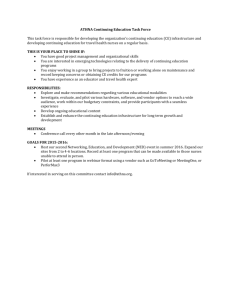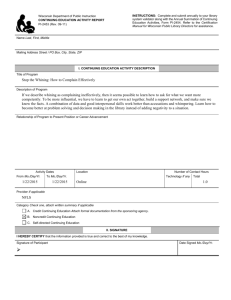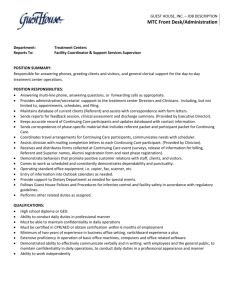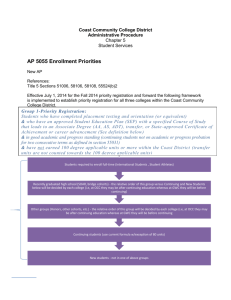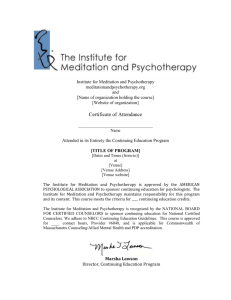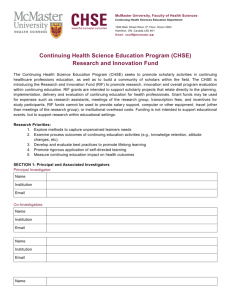Human resource development of knowledge workers through adult
advertisement
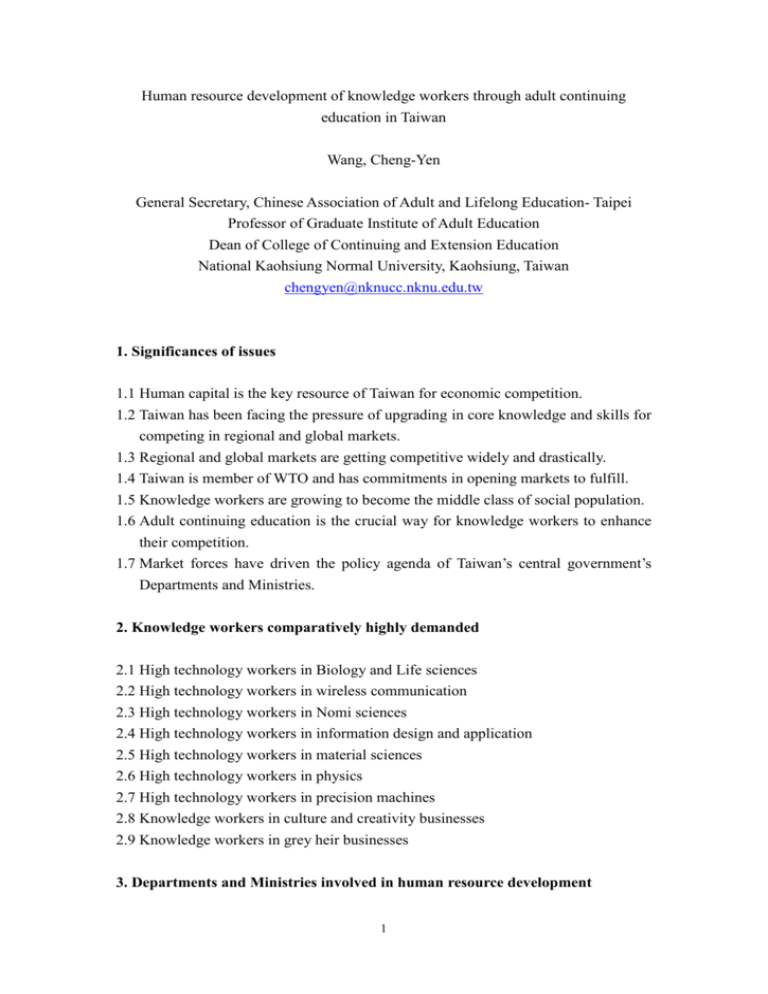
Human resource development of knowledge workers through adult continuing education in Taiwan Wang, Cheng-Yen General Secretary, Chinese Association of Adult and Lifelong Education- Taipei Professor of Graduate Institute of Adult Education Dean of College of Continuing and Extension Education National Kaohsiung Normal University, Kaohsiung, Taiwan chengyen@nknucc.nknu.edu.tw 1. Significances of issues 1.1 Human capital is the key resource of Taiwan for economic competition. 1.2 Taiwan has been facing the pressure of upgrading in core knowledge and skills for competing in regional and global markets. 1.3 Regional and global markets are getting competitive widely and drastically. 1.4 Taiwan is member of WTO and has commitments in opening markets to fulfill. 1.5 Knowledge workers are growing to become the middle class of social population. 1.6 Adult continuing education is the crucial way for knowledge workers to enhance their competition. 1.7 Market forces have driven the policy agenda of Taiwan’s central government’s Departments and Ministries. 2. Knowledge workers comparatively highly demanded 2.1 High technology workers in Biology and Life sciences 2.2 High technology workers in wireless communication 2.3 High technology workers in Nomi sciences 2.4 High technology workers in information design and application 2.5 High technology workers in material sciences 2.6 High technology workers in physics 2.7 High technology workers in precision machines 2.8 Knowledge workers in culture and creativity businesses 2.9 Knowledge workers in grey heir businesses 3. Departments and Ministries involved in human resource development 1 There are cross- Departments and cross- Ministries mainly or partly responsible for human resource development of knowledge workers at the level of central government. Specifically, 3.1 Ministry of Education: in educational affairs and policies 3.2 Ministry of Economic Affairs: in economic and market policies 3.3 The Central Personnel Administration: in continuing education for civil servants 3.4 The Council for Economic Planning and Development: in programming plans and projects for market growth and competition 3.5 The National Youth Commission: in youth services and human resource development 3.6 The National Science Council: in research and creation of technology for production 3.7 The Council for Cultural Affairs: in culture and creativity businesses 3.8 The Council of Labor Affairs: in continuing education and training for labors 4. Major strategies through adult continuing education for human resource development of knowledge workers 4.1 Formulating policy projects or white papers as guidelines and contents 4.2 Raising special funding for specific policy projects 4.3 Enhancing the accountability of related affairs based on projects or white papers in each individual Ministry and Department 4.4 Highlighting on collaboration and coordination between different Ministries and Departments 4.5 Linking multiple stakeholders eg enterprisers, businessmen, professional associations and higher education institutions with governmental sectors in carrying out policy projects 4.6 Offering grants for employers to sponsor employees’ in-service education and training or to support employees’ continuing education in higher education institutions according to demanded subjects and fields of human resource development 4.7 Encouraging higher education institutions to offer short-term and long-term courses of demanded subjects and fields for credit, degree and accreditation, particularly at postgraduate level 4.8 Collaborating with professional associations to serve their members and provides courses in demanded subjects and fields of human resource development 2 5. Current issues and difficulties to be solved 5.1 Coordination between different Ministries and Departments has to be improved. 5.2 Effectiveness of collaboration between different stakeholders has to be enhanced. 5.3 The gap between enterprises’ and businesses’ demands of human resource development and courses and subjects provided by higher education institutions has to be bridged. 5.4 A more integrated, complete and continuing policy project or white paper for educating demanded knowledge workers through adult continuing education has to be formulated and improved in view of sustainable development. 5.5 An effective mechanism organized by multiple stakeholders and based on adult continuing education served mainly by higher education institutions for developing human resource of knowledge workers has to be formed and focused on. 5.6 The core function and professional status of adult continuing education for developing human resource of knowledge workers are still too insufficient to fulfill its role. 5.7 Clarification of conception, definition and implementation of adult continuing education for different stakeholders to achieve better communication is still highly demanded. 5.8 The characteristics of adult continuing education in integrated disciplines for developing human resource of knowledge workers have not been successfully presented. 5.9 Professionals of adult continuing education are not involved sufficiently in policy-making for developing human resource of knowledge workers at the level of central government. 5.10 Too many stakeholders involved in developing human resource of knowledge workers result in the high challenge about how to share limited government’s resource and how to enlarge the effectiveness of resource investment. 5.11 A well designed evaluation methodology for improving policies and strategies regarding developing human resource of knowledge workers via adult continuing education is greatly demanded. 6. Implications from Taiwan to other EAFAE members 6.1 How to find out the shortage of knowledge workers precisely according to analyzing multiple influential factors? 6.2 How to classify demanded knowledge workers clearly into different groups for 3 following educational strategies? 6.3 How to invite and integrate different key stakeholders to become helpful partners for developing human resource of knowledge workers? 6.4 How to involve professionals of adult continuing education in governmental policy-making and higher education institutions’ programming in curriculum? 6.5 How to reflect employers’ and markets’ demands on curriculum and programmes offered by higher education institutions? 6.6 How to develop the mechanism formulated by different stakeholders like government’s policy-makers, employers and professionals of adult continuing to cultivate knowledge workers? 6.7 How to keep changing to meet the demands and expectation of employers and markets in terms of educational providers ie higher education institutions? 6.8 How to improve frequent and effective dialogues between different stakeholders to bridge the gap between supply side and consume side in developing human resource of knowledge workers, especially higher education institutions and others? 6.9 How to define the role of adult continuing education on developing human resource of knowledge workers to meet the needs demanded by local, regional and global markets? 6.10 How to develop human resource of knowledge workers for regional markets via effective collaboration between multiple professionals of adult continuing education in different countries and arenas? 4

